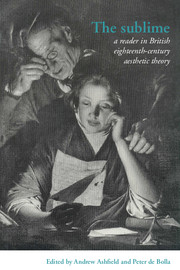Book contents
- Frontmatter
- Contents
- List of Abbreviations
- Introduction
- Part I The Longinian tradition
- 1 Dionysius Longinus on the sublime (1743)
- 2 Remarks on a book entitled, Prince Arthur (1696)
- 3 The advancement and reformation of modern poetry (1701)
- 4 The grounds of criticism in poetry (1704)
- 5 Essays upon several subjects (1716)
- 6 A miscellany of ingenious thoughts (1721)
- 7 An essay on the theory of painting (1725)
- 8 Reflections on the nature and property of languages (London 1731)
- 9 The works (1735)
- 10 Lectures on poetry (1742)
- Part II Rhapsody to rhetoric
- Part III Irish Perspectives
- Part IV The Aberdonian Enlightenment
- Part V Edinburgh and Glasgow
- Part VI From the Picturesque to the Political
- Sources and further reading
5 - Essays upon several subjects (1716)
Published online by Cambridge University Press: 05 June 2012
- Frontmatter
- Contents
- List of Abbreviations
- Introduction
- Part I The Longinian tradition
- 1 Dionysius Longinus on the sublime (1743)
- 2 Remarks on a book entitled, Prince Arthur (1696)
- 3 The advancement and reformation of modern poetry (1701)
- 4 The grounds of criticism in poetry (1704)
- 5 Essays upon several subjects (1716)
- 6 A miscellany of ingenious thoughts (1721)
- 7 An essay on the theory of painting (1725)
- 8 Reflections on the nature and property of languages (London 1731)
- 9 The works (1735)
- 10 Lectures on poetry (1742)
- Part II Rhapsody to rhetoric
- Part III Irish Perspectives
- Part IV The Aberdonian Enlightenment
- Part V Edinburgh and Glasgow
- Part VI From the Picturesque to the Political
- Sources and further reading
Summary
An essay on the nature and constituion of epic poetry.
Of the marvellous
Another thing indispensably required to the constitution of an epic poem is, that the narration be marvellous; and the reason is, that when the poet intends to give delight and convey instruction, as admiration engages attention, so it prepares and opens the mind to admit the force of the poet's sentiments, and receive from them deep impressions. Hence the beautiful and surprising turns, as well in the diction as the incidents of a noble poem, strike the imagination with resistless force, break in upon the soul and excite generous and divine passions suitable to the subject. This therefore is a necessary property, by which the poet is qualified to gain his principal end, which is to afford pleasure and instruction; and is a peculiar and inseparable character, that limits the general nature of poetry, and makes the epic differ from the tragic, to which however it is more nearly allied than to any other species.
All things excite admiration that either transcend the sphere of finite activity, or that break the usual series of natural causes and events. The first sort, which proceed from almighty power, are styled miracles: I shall not here by a strict disquisition, enter into the nature and definition of a miracle, which some look upon as an immediate effect of unlimited might, and others as an action which the spectators believe the supreme being to be the author of, while they are unable to account for any natural cause, from whence it should arise.
- Type
- Chapter
- Information
- The SublimeA Reader in British Eighteenth-Century Aesthetic Theory, pp. 40 - 42Publisher: Cambridge University PressPrint publication year: 1996



